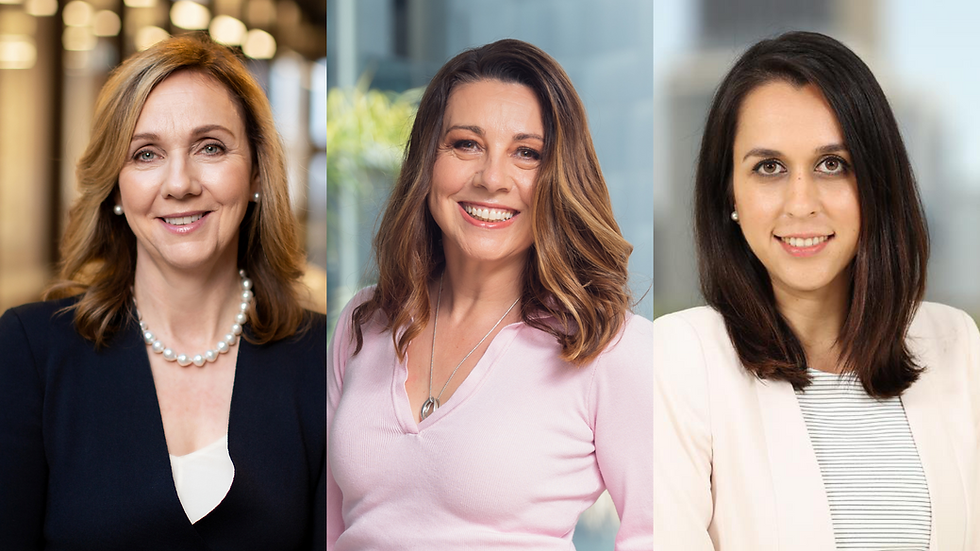June Oscar Raises the Voices of Indigenous Women to Mend Australia’s Social Fabric
- Apr 16, 2024
- 4 min read
Updated: Apr 18, 2024

Words by Emma Macdonald
Proud Bunuba woman June Oscar began her Women in Media National Press Club Address on March 27 with a selection of words from some of the 2000 Indigenous women and girls she consulted during her seven years as Australia’s Aboriginal and Torres Strait Islander Social Justice Commissioner. Emma Macdonald, Women in Media’s ACT Convenor collaborates with the National Press Club of Australia on addresses by influential and prominent women. She reports on June Oscar’s address here.
“We are the ones that are the back bone … that everyone depends on to get things done.” Women from Cairns
“What keeps me strong is my grandmothers—they didn’t have the power to have a voice and I am bloody determined to make sure my girls have a voice.” Women from Dubbo
“Women are the social fabric of communities and the glue that holds everything together.” Women from Mount Isa
June’s most enduring achievement during her term—which ends in April—is to have given voice to the Indigenous sisterhood through her Wiyi Yani U Thangani project (which means ‘Women’s Voices’ in the Bunuba language).
On the same day of the National Press Club Address, the Federal Government signed off on a four-year, $3 million dollar package for the Wiyi Yani U Thangani Institute for First Nations Gender Justice at ANU, dedicated to research for improving outcomes for Indigenous women and girls.
And as the first woman to hold the position at the Australian Human Rights Commission, Oscar has committed herself to lead the institute and help Australia build a stronger "social fabric".
“I know that our women and girls live rich lives, which matter to the healthy formation and growth of societies and environments. But we’ve been made invisible by a narrow frame of deficit. Through the Institute and Change Agenda, we’ve put on the national landscape a visionary framework that defines our rights and shows us in our entirety for all the worth we bring to the world,” she told the Press Club.
“We have a new frame to see us—a First Nations Gender Justice lens. Our Institute, based at the Australian National University, will use this lens and actively reconstruct the social fabric, the bedrock of Australian nation-building, to benefit all Australians.”

To a sold-out event broadcast live across the nation through the ABC, June revealed the generational trauma her mother and grandmother had endured.
“My grandmother was raised by my great-grandmother who had lived through, what we call in the Kimberley, the killing times. Several hundreds of our Bunuba peoples died in this brutal British take-over of our lands in the 1890s. At the time of invasion, there was approximately two and a half thousand Bunuba peoples. In the 1930s an anthropologist, Phyllis Kaberry, calculated that we had been reduced to a tenth in size. In the greatness of our civilisation spanning millennia, this was apocalyptic.”
Oscar's grandmother, living in the aftermath of this decimation, turned her back on white society. Oscar’s mother worked as an indentured house aid and June was forcibly taken to the mission school.
"Our existences at the time were denied, emphasised by the fact that my father, a white station owner, never acknowledged me or my Indigenous siblings in his lifetime,"
she said.
Reflecting on the results of last year’s First Nation’s Voice referendum, Oscar said it was a “really, truly, nationally missed opportunity”.
She also felt Australia would need to enter a process of reckoning over the way in which its political and media climate allowed misinformation to flourish during the debate.
"The Voice fell victim to what it aimed to counteract: mass discontent with socio-economic conditions which globally have given rise to sectarianism and populism, fuelling a surge in mis- and disinformation," she said.
"This burgeoning industry of lies and discriminations masquerading as truth and justice erodes our trust towards each other, government institutions and, for me, most significantly our ability to work together—the public with decision-makers—to weave, protect and sustain the social fabric."

But the Wiyi Yani U Thangani Institute would help foster dialogues of truth.
Oscar believed: “It will overwhelmingly be Indigenous and non-Indigenous women and young people from across cultural backgrounds that will guide us into a new era of truth-telling. Both groups were more likely to vote yes than men and older people in the referendum. As I have said, women are less likely to see themselves valued in mainstream structures and as such are more open, I think, to understanding the lives of others and forming more inclusive structures.”
"When we know each other, we can listen without fear, and act together with integrity and humility, walking into a future where we lay the foundations to account for everyone and exclude no one,"
she concluded.
In an address which was ultimately hopeful, Oscar said it was her grandmother who gave her a vision for the future where women's voices were heard.
"I exist holding this vision, where I stand tall next to my grandmothers and mothers, our feet bare in the warm pindan soils of our country; gathered around us are our peoples and hundreds of other women and men with heritages from every part of the world, and there too are my non-Indigenous brothers and sisters, their children and theirs and so on," she said.
"We all hold digging sticks and seeds, fires are lit, we sing, Country hums. All is safe, all is well."
You can watch June Oscar's Women in Media Press Club Address here.
Emma Macdonald OAM is associate editor of HerCanberra, co-founder of maternal health charity Send Hope Not Flowers, and Women in Media’s ACT Convenor. She works with the National Press Club of Australia to present addresses by women of note.
Other Women in Media National Press Club of Australia addresses presented by Emma Macdonald include:
Grace Tame, 2021 Australian of the Year
Em Rusciano, comedian, podcaster and writer
Ronni Khan, social entrepreneur and founder of food charity, OzHarvest
Georgie Stone OAM, transgender rights advocate
Clare Bowditch, ARIA award winning musician and best-selling author
Taryn Brumfitt, 2023 Australian of the Year
Aminata Conteh-Biger, Founder and CEO of Aminata Maternal Foundation
Robyn Denholm, chair of Tesla’s board of directors



